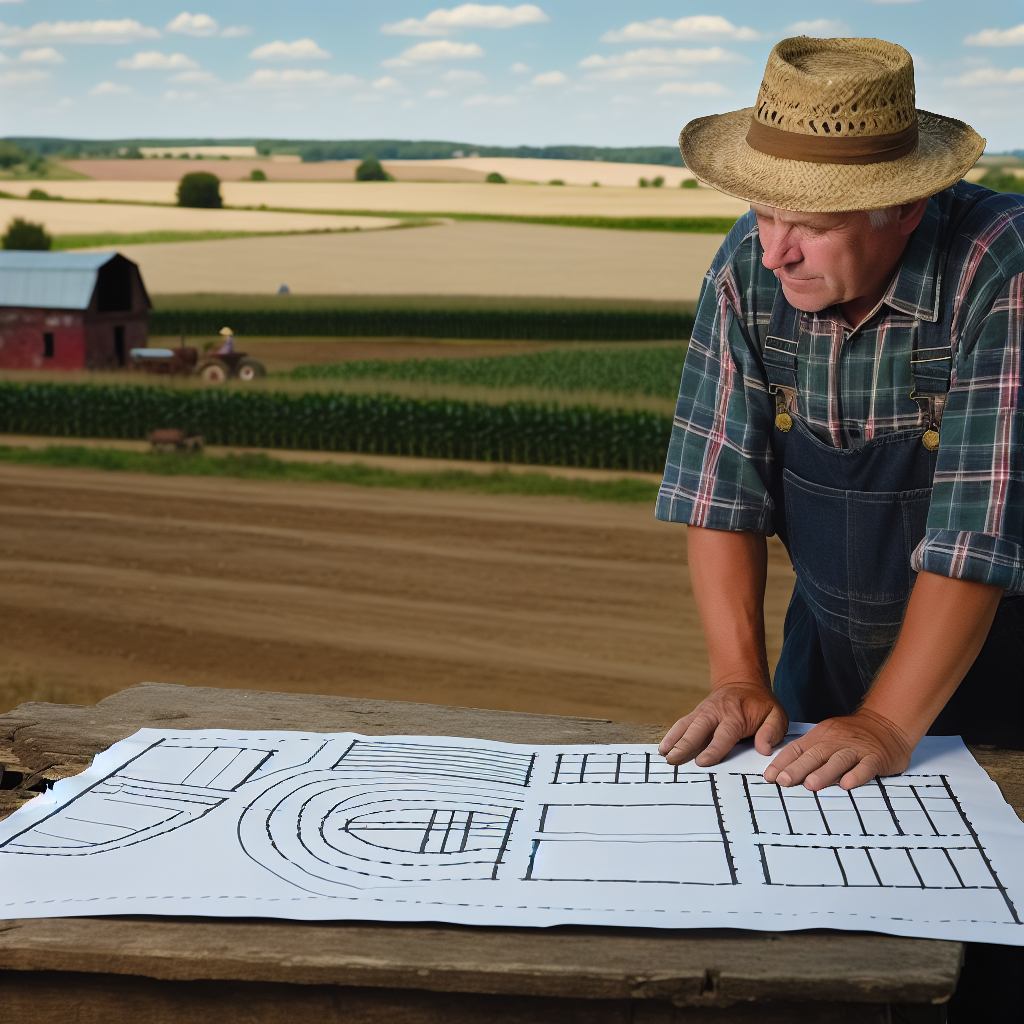Understanding Zoning Regulations: An Overview for Farmers
The Importance of Zoning Regulations
Zoning regulations dictate land use and development standards.
They ensure agricultural activities coexist with residential and commercial areas.
Moreover, these regulations help protect the environment and community health.
Farmers must understand zoning laws to avoid legal penalties.
Types of Zoning Regulations
There are several types of zoning regulations relevant to farmers.
They include residential, commercial, industrial, and agricultural zones.
Each zone has specific uses; understanding these classifications is crucial.
For instance, agricultural zones usually permit farming activities.
Local Zoning Codes
Every municipality has its zoning codes and ordinances.
Farmers should review these codes to comprehend local restrictions.
These codes might dictate the type of structures farmers can build.
Additionally, they may regulate the size and placement of those structures.
How to Research Zoning Regulations
Researching zoning regulations involves multiple steps.
First, visit your local planning or zoning office.
They often provide resources and guidance for farmers.
Transform Your Agribusiness
Unlock your farm's potential with expert advice tailored to your needs. Get actionable steps that drive real results.
Get StartedSecondly, consider utilizing online databases for zoning information.
Many counties maintain updated information online.
Engaging with Local Authorities
Engage with local authorities for clarity on zoning laws.
Attending community meetings can yield valuable insights.
These meetings often discuss upcoming zoning proposals or changes.
Moreover, establishing a relationship can help in resolving future issues.
Compliance and Violations
Compliance with zoning regulations is vital for success.
Violations can lead to fines, penalties, or forced changes.
Farmers should regularly review their practices to ensure compliance.
Documenting all operations can also help in case of disputes.
Seeking Professional Assistance
Consulting professionals may be beneficial in complex zoning matters.
Land use attorneys can provide expert guidance on zoning laws.
Additionally, agricultural consultants may offer valuable insights.
Investing in this knowledge can save time and money in the long run.
The Importance of Zoning Compliance in Agricultural Practices
Understanding Zoning Regulations
Zoning regulations dictate land use and development rights.
These laws vary by region and significantly impact agricultural operations.
Farmers must understand these regulations to operate legally.
Avoiding Legal Issues
Non-compliance can lead to costly legal disputes.
Farmers risk fines and the possibility of losing their land.
Therefore, it is crucial to stay informed about zoning laws.
Enhancing Farm Viability
Compliance with zoning regulations can enhance farm viability.
It allows farmers to maximize their potential for growth and expansion.
Additionally, it helps in creating sustainable business practices.
Access to Resources
Compliance can facilitate access to funding and grants.
Showcase Your Farming Business
Publish your professional farming services profile on our blog for a one-time fee of $200 and reach a dedicated audience of farmers and agribusiness owners.
Publish Your ProfileMany agencies prioritize projects that meet zoning requirements.
Farmers can benefit from these resources to improve their operations.
Community Relations
Maintaining zoning compliance fosters positive community relations.
It shows respect for local regulations and community interests.
Engaged community members are more likely to support local farms.
Long-term Planning
Understanding zoning regulations aids in long-term planning.
Farmers can make informed decisions about land use changes.
This foresight helps in adapting to future agricultural trends.
Key Zoning Terms Every Farmer Should Know
Understanding Zoning
Zoning regulates land use within a community.
Each zone has specific regulations for building and farming activities.
Knowledge of zoning helps in avoiding legal issues.
Check your local zoning laws regularly for updates.
Types of Zoning
Different types of zoning include residential, commercial, and agricultural.
Residential zoning restricts building to homes.
Commercial zoning allows for business operations.
Agricultural zoning supports farming and related activities.
Zoning Districts
Zoning districts define specific areas within a jurisdiction.
Each district has its own set of rules and purposes.
Farmers must know which district their land falls under.
This knowledge ensures compliance with local regulations.
Zoning Permits
Zoning permits are essential for new construction projects.
Obtaining a permit involves submitting plans to local authorities.
Ensure all applications are thorough and accurate.
Permits prevent misunderstandings and potential fines.
Non-Conforming Use
A non-conforming use refers to existing uses that violate current zoning regulations.
This category often includes older farms in urban areas.
These uses can continue, but expansion may be restricted.
Consult local zoning boards for guidance on non-conforming status.
Conditional Use Permits
Conditional use permits allow specific uses in a zoning area.
Applications require a public hearing to discuss potential impacts.
Farmers may need these permits for activities like markets.
Understanding the criteria is crucial for a successful application.
Zoning Maps
Zoning maps visualize different zoning areas in a community.
Farmers should review these maps regularly.
Changes may affect future farming operations.
Local planning departments typically provide updated versions.
Gain More Insights: Strategies for Exporting Farm Produce
How to Conduct a Zoning Compliance Check on Your Farm
Familiarize Yourself with Local Zoning Regulations
Understanding local zoning regulations is essential for farmers.
Check your municipality’s zoning code for specific requirements.
These regulations may vary significantly between areas.
Showcase Your Farming Business
Publish your professional farming services profile on our blog for a one-time fee of $200 and reach a dedicated audience of farmers and agribusiness owners.
Publish Your ProfileContact local zoning offices for accessible resources.
Consider attending community meetings to learn more.
Create a Zoning Compliance Checklist
A checklist can streamline your compliance process.
Include items such as land use and building permits.
Also, note any restrictions applicable to your farm.
Be sure to update the checklist regularly as regulations change.
Consult with a Land Use Attorney
A land use attorney can provide expert guidance.
They offer insights into complicated zoning laws.
Moreover, they can help you navigate the compliance process.
Consider scheduling an initial consultation to discuss your concerns.
Conduct a Physical Inspection of Your Property
Regular property inspections are crucial for compliance.
Identify any potential zoning violations during the inspection.
Document your findings with notes and photographs.
This documentation can be helpful if disputes arise.
Stay Updated on Zoning Changes
Zoning laws frequently change, impacting your operations.
Subscribe to local government newsletters for updates.
Join farmer associations that inform members about zoning changes.
Utilize online resources for the latest zoning news.
Gain More Insights: Tax Filing Tips for Successful Farmers
Permits and Licenses: Navigating the Application Process
Understanding Local Regulations
Familiarize yourself with local zoning laws and regulations.
Each area has different requirements for farming operations.
Consider consulting with a local zoning office for guidance.
This knowledge helps in avoiding costly mistakes.
Identifying Required Permits
Determine which permits are needed for your farming activities.
Common permits include building, land use, and environmental permits.
Each type of farming may require specific licenses.
List the permits you need and keep them organized.
Preparing Your Application
Gather all necessary documents before starting the application process.
Include maps, project descriptions, and environmental assessments.
Make sure your application is complete and accurate.
Ask for help if you’re unsure about any part of the process.
Submitting Your Application
Follow the submission guidelines for your local authority.
Ensure you submit your application by the deadline.
Keep copies of all documents for your records.
Be prepared to pay any applicable fees.
Handling Follow-Up and Inspections
Stay in contact with the zoning office after submission.
They may request additional information or clarifications.
Prepare for possible inspections of your property.
Address any concerns they might raise promptly.
Staying Compliant After Approval
Abide by all conditions set forth in your permits.
Showcase Your Farming Business
Publish your professional farming services profile on our blog for a one-time fee of $200 and reach a dedicated audience of farmers and agribusiness owners.
Publish Your ProfileKeep up with any changes in local zoning laws.
Regularly review your operations for compliance.
Stay informed about updates on permits and laws that may affect you.
Learn More: Differences Between Organic And Conventional

Common Zoning Violations in Farming and How to Avoid Them
Understanding Zoning Laws
Zoning laws dictate how land can be used.
They help maintain order and safety in communities.
Farmers must understand these laws to avoid violations.
Typical Zoning Violations in Agriculture
One common violation involves operating without a proper zoning permit.
Farmers may also violate regulations by exceeding allowed livestock numbers.
Using land for unauthorized activities can lead to penalties.
Improperly placing structures, like barns or silos, can also be a problem.
Strategies for Avoiding Zoning Violations
Before starting any project, research local zoning ordinances.
Contact local zoning offices to clarify any uncertainties.
Develop a clear business plan that considers zoning constraints.
Attend community meetings to stay informed about zoning issues.
Utilizing Professional Guidance
Consider consulting with a land use attorney for guidance.
A zoning consultant can help navigate complex regulations.
Professional advice can save time and prevent costly mistakes.
Staying Updated with Zoning Changes
Regularly check for updates to local zoning laws.
Join agricultural organizations that inform members of changes.
Subscribe to newsletters from local government for timely information.
Understanding changes can help mitigate risks of violations.
You Might Also Like: Choosing The Right Organic Certification Body
Resources and Tools for Staying Updated on Zoning Changes
Local Government Websites
Your local government website often provides updates on zoning regulations.
Check these sites regularly for important announcements.
Many municipalities have newsletters that highlight changes.
Sign up for email alerts to receive immediate updates.
County Planning Offices
County planning offices are valuable resources for farmers.
They offer guidance on zoning issues and compliance.
Consult them for any proposed changes affecting your property.
Meeting with planners can facilitate better understanding.
Online Zoning Databases
Consider leveraging online zoning databases for more information.
Websites like ZoningInfo offer extensive zoning maps and regulations.
These platforms often include user-friendly search functions.
Utilizing these tools can save time and effort in research.
Professional Associations
Join professional associations within the agricultural sector.
Groups like the National Farmers Union provide updates on zoning issues.
These associations often host webinars and workshops.
Active membership keeps you informed and connected.
Social Media and Online Forums
Engage with other farmers on social media platforms.
Showcase Your Farming Business
Publish your professional farming services profile on our blog for a one-time fee of $200 and reach a dedicated audience of farmers and agribusiness owners.
Publish Your ProfileFacebook groups and Reddit forums often share zoning news.
These communities can provide insights and personal experiences.
Follow local advocacy groups for real-time updates.
Consultants and Legal Advisors
Hire professionals who specialize in zoning laws.
Consultants can help navigate complex regulations.
Legal advisors will be essential for compliance and disputes.
Regular consultations ensure you remain informed on changes.
News Outlets and Industry Publications
Subscribe to agricultural news outlets and magazines.
Publications often cover zoning changes and their implications.
Look for local newspapers that report on agricultural issues.
Staying current with news can help you adapt your practices.
Working with Local Authorities
Establishing Trust
Building relationships with local authorities is essential for modern farmers.
Start by introducing yourself and your farm’s mission.
Understand their common concerns and regulatory requirements.
Be approachable and proactive in your communications.
Attend community meetings to showcase your commitment.
Effective Communication
Clear communication is vital for securing compliance.
Share your farming plans and ask for feedback early on.
Keep documentation organized to facilitate discussions.
Respond promptly to queries from local officials.
Use simple language to avoid misunderstandings.
Being Informed and Prepared
Stay updated on local zoning regulations that affect farming.
Visit municipal websites for the latest zoning notices.
Join local agricultural associations to access resources.
Consult with legal professionals experienced in agricultural law.
Prepare for unexpected inspections with a compliance checklist.
Building Collaborative Solutions
Work collaboratively with local authorities to create solutions.
Participate in discussions about zoning improvements.
Offer ideas based on your practical experiences as a farmer.
Be open to compromise while advocating for your needs.
Foster a culture of cooperation by supporting local initiatives.
Additional Resources
Aligning Food Systems Policies to Advance Public Health – PMC




